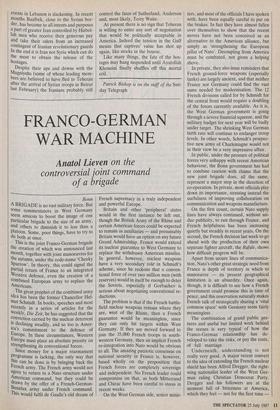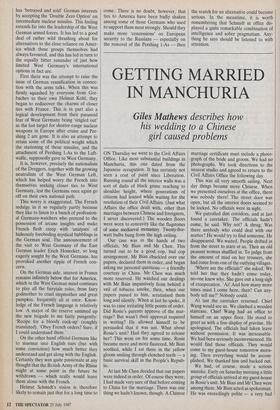FRANCO-GERMAN WAR MACHINE
Anatol Lieven on the
controversial joint command of a brigade
Bonn A BRIGADE is no vast military force. But some commentators in West Germany seem anxious to boost the image of one particular brigade to the size of an army, and others to diminish it to less than a platoon. Some, poor things, have to try to do both at once.
This is the joint Franco-German brigade the creation of which was announced last month, together with joint manoeuvres for the autumn, under the code-name 'Cheeky Sparrow'. In theory, this could signal the partial return of France to an integrated Western defence, even the creation of a combined European army to replace the Americans.
The great prophet of the combined army idea has been the former Chancellor Hel- mut Schmidt. In books, speeches and most recently in a series of articles for the weekly, Die Zeit, he has suggested that the conviction carried by the nuclear deterrent is declining steadily, and so too is Amer- ica's commitment to the defence of Europe. In these circumstances, Western Europe must place an absolute priority on strengthening its conventional forces. Since money for a major rearmament Programme is lacking, the only way that this can be done is by bringing back the French army. The French army would not agree to return to a Nato structure under American command, but they could be drawn by the offer of a French-German- Benelux army under French command. This would fulfil de Gaulle's old dream of French supremacy in a truly independent and powerful Europe.
Britain and other 'peripheral' states would in the first instance be left out, though the British Army of the Rhine and certain American forces could be expected to remain as auxiliaries — and presumably Britain would have an option on any future Grand Admitalship. France would extend its nuclear guarantee to West Germany to replace the withdrawn American missiles. In general, however, nuclear weapons have a very secondary role' in Schmidt's scheme, since he reckons that a conven- tional force of over two million men (with reserves) would in itself be enough to deter the Soviets, especially if Gorbachev is serious about negotiating conventional re- ductions.
The problem is that if the French battle- field nuclear weapons remain where they are, west of the Rhine, then a French guarantee would be meaningless, since they can only hit targets within West Germany. If they are moved forward to join the 35,000 French troops in south- western Germany, then an implicit French re-integration into Nato would be obvious to all. The amazing patriotic consensus on national security in France is, however, based wholly on the proposition that French forces are completely sovereign and independent. No French leader could compromise on that, as both Mitterrand and Chirac have been careful to stress in recent weeks.
On the West German side, senior minis- ters, and most of the officials I have spoken with, have been equally careful to put on the brakes. In fact they have almost fallen over themselves to show that the recent moves have not been conceived as an alternative to the American alliance, but simply as 'strengthening the European pillar of Nato'. Decoupling from America must be combated, not given a helping shove.
In private, they also issue reminders that French ground-force weapons (especially tanks) are largely ancient, and that neither France nor Germany could find the vast sums needed for modernisation. The 12 French divisions called for by Schmidt for the central front would require a doubling of the forces currently available. As it is, the West German government is going through a severe financial squeeze, and the military budget for next year will be badly under target. The shrinking West German birth rate will continue to endanger troop levels. In other words, Schmidt's prospec- tive new army of Charlemagne would not in their view be a very impressive affair.
In public, under the pressure of political forces very unhappy with recent American behaviour, the Bonn government has had to combine caution with claims that the new joint brigade does, all the same, represent a major step in the direction of co-operation. In private, most officials play down its importance, stressing instead the usefulness of improving collaboration on communication and weapons manufacture.
On the first count, certain Nato supply lines have always continued, without un- due publicity, to run through France, and French helpfulness has been increasing quietly but steadily in recent years. On the second, the French decision last week to go ahead with the production of their own separate fighter aircraft, the Rafale, shows how difficult progress will be.
Apart from secure lines of communica- tion, Nato's other great strategic need from France is depth of territory in which to manoeuvre — its present geographical limitation is an absurdity. Once again, though, it is difficult to see how a French government could promise this in time of peace, and this reservation naturally makes French talk of strategically sharing a 'vital common space' with Germany seem fairly meaningless.
The combination of grand public ges- tures and useful but limited work behind the scenes is very typical of how the Franco-German relationship has de- veloped to take the risks, or pay the costs, of full marriage.
Underneath, understanding is not really very good. A major recent convert to the idea of extending the French nuclear shield has been Alfred Dregger, the right- wing nationalist leader of the West Ger- man ruling Christian Democrat Party. Dregger and his followers are at the moment full of bitterness at America, which they feel — not for the first time — has 'betrayed and sold' German interests by accepting the 'Double Zero Option' on intermediate nuclear missiles. This feeling extends far into the leadership of the West German armed forces. It has led to a good deal of rather wild thrashing about for alternatives to the close reliance on Amer- ica which these groups themselves had always favoured, and this has led in turn to the equally bitter reminder of just how limited West Germany's international options in fact are.
First there was the attempt to raise the issue of German reunification in connec- tion with the arms talks. When this was firmly squashed by everyone from Gor- bachev to their own Helmut Kohl, they began to rediscover the charms of closer ties with France. This is in part also a logical development from their paranoid fear of West Germany being 'singled out' as the last target for shorter-range nuclear weapons in Europe after cruise and Per- shing 2 are gone. It is also an attempt to retain some of the political weight which the stationing of those missiles, and the attachment of Pershing 1-As to the Luft- waffe, supposedly gave to West Germany.
It is, however, precisely the nationalism of the Dreggers, together with the growing neutralism of the West German Left, which has helped worry the French into themselves seeking closer ties to West Germany, lest the Germans once again go off on their own national path.
This worry is exaggerated. The French indulge in it so regularly partly because they like to listen to a bunch of profession- al Germany-watchers who pretend to the possession of arcane insights and make French flesh creep with 'analyses' of hideously foreboding mystical bubblings in the German soul. The announcement of the visit to West Germany of the East German leader Erich Honecker, so long eagerly sought by the West Germans, has provoked another ripple of French con- cern.
On the German side, interest in France remains infinitely below that for America, which in the West German mind continues to play all the fairytale roles, from fairy godmother to cruel stepmother and great pumpkin, frequently all at once. Know- ledge of the French language is relatively low. A major of the reserve summed up the new brigade to me fairly pungently: `Recipe for a bloody cock-up' (roughly translated). 'Obey French orders? Sure, if I could understand them.'
On the other hand official Germans like to murmur into English ears (but with some conviction) how much better they understand and get along with the English. Certainly they wax quite passionate at any thought that the British Army of the Rhine might at some point in the future be withdrawn — which really would leave them alone with the French.
Helmut Schmidt's vision -is therefore likely to remain just that for a long time to come. There is no doubt, however, that ties to America have been badly shaken among some of those Germans who used to support them most strongly. Should they make more 'concessions' on European security to the Russians — especially on the removal of the Pershing 1-As — then the search for an alternative could become serious. In the meantime, it is worth remembering that Schmidt in office dis- played a quite remarkable combination of intelligence and sober pragmatism. Any- thing he says should be listened to with attention.



















































 Previous page
Previous page